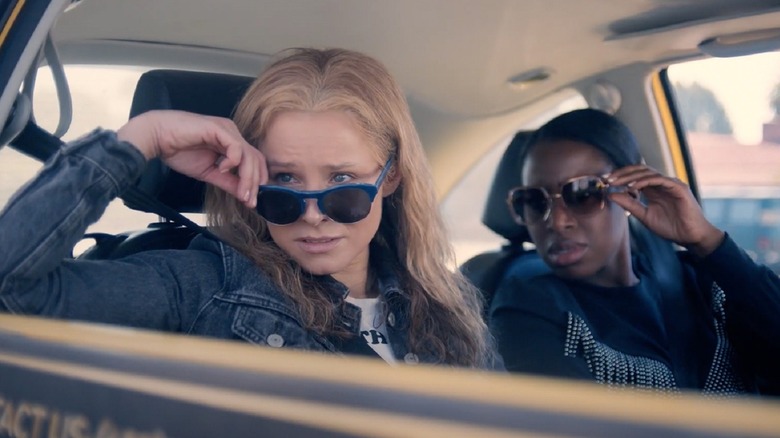Queenpins Review: A Solid Cast Comes Close To Saving A Weak Script
It's one of the oldest axioms in the book: crime doesn't pay. Whether or not that's actually true, it's served as the foundation for countless crime-focused movies over a century, to the point that it's notable when a film gleefully bucks the trend and argues, essentially, "What if crime...good?" That, in effect, is the question being asked throughout the entirety of the inspired-by-a-true-story new dark comedy "Queenpins," in which two suburban women go into business with each other by defrauding massive companies through an unlikely source: coupons. "Queenpins" boasts a cast of talented ringers, who elevate the muddled material far more than it deserves, without actually resulting in an all-around good movie.
Kristen Bell plays Connie Kaminski, an Olympic gold medalist for speed-walking (ridiculous though it may seem, that really is an Olympic event) whose glory days are far behind her. Now, she's a housewife in Phoenix, Arizona, whose auditor husband (Joel McHale) has grown more distant and standoffish after multiple failed attempts to conceive a child. Bell's "Good Place" co-star Kirby Howell-Baptiste is JoJo Johnson, who lives nearby with her mother and is trying to create a social-media brand without much success. When Connie and JoJo realize that the surprisingly vast world of coupons could lead to scenarios in which they get coupons for free items simply by complaining, and that others may well buy such coupons for cash, they embark upon a business that's chintzy (with a website design straight out of 90s-era Geocities), but profitable enough that it rakes in millions of dollars and draws the attention of a grocery-store loss prevention officer (Paul Walter Hauser) and a U.S. Postal Inspector (Vince Vaughn).
Writers-directors Aron Gaudet and Gita Pullapilly have been gifted here with a daffy premise straight out of a Coen Brothers film; as goofy as it is, there really was a case roughly a decade ago in the Valley of the Sun where a trio of women were arrested for operating a fraudulent coupon website. The problem is that this is not a Coen Brothers film. Bell's natural sunniness and chipper personality work well in creating a complex lead character in Connie, who struggles to genuinely do the right thing and is frustrated to see that others excel without putting in the work. Howell-Baptiste has a bit less to do, but is equally fun (and her American accent is pretty damn flawless). The problem, though, is that while both actresses do their able best to create multi-dimensional figures out of Connie and JoJo, the script gives them meager details to work with.
A More Compelling Subplot
It's equally frustrating that Gaudet and Pullapilly seem far more invested in what is essentially the B-plot of "Queenpins" than in their main characters. Or maybe it's just that Vince Vaughn and Paul Walter Hauser make for a far more dynamic and genuinely odd couple, as a calm and collected federal agent and an awkward and stressed would-be grocery-store cop, respectively. Hauser, for his own part, seems to be the closest thing the film has to an emotional core, calling to mind a slightly more self-aware version of the title character he played in Clint Eastwood's "Richard Jewell". And Vaughn, so well-known for having played the fast-paced, rat-a-tat chatterbox in plenty of raunchy comedies of the early 2000s, plays things more even-keeled and laid-back, balancing nicely with Hauser's more unhinged personality. For much of the film, though their characters are tailing our protagonists, the latter duo are so gleefully unaware of being tracked that it's like two different movies wedged into one.
The problem is twofold: one of these two mini-movies is a lot more entertaining (if sometimes a bit too easily besotted with gross-out humor for the sake of simply being in the movie, as with Hauser's character having his daily bathroom schedule upended to messy results), and the weaker mini-movie has material that feels far less fleshed out. If anything, the situation should be reversed. If either of the film's halves are going to be weakened, shouldn't the part with the inexplicably successful criminals be more fully rounded?
Though "Queenpins" did take its inspiration from a real-life story, it only takes a brief Google search after the film to learn exactly how much creative license was taken with the story. And that's fine — this movie's dark sense of humor is arguably too knowing and clever to be based purely in fact, and creative license is taken in many different films. It's the nature of the business. But the film's blase attitude towards the crimes being committed, and the weirdly happy conclusion that emboldens the idea that crime can be good and the people trying to take you down just need to loosen up a bit, also raises a question of why the film itself should even exist. If the scheme that Connie and JoJo pull is so miniscule in the grand scheme of things, if no one really cares when push comes to shove, then why make the movie to begin with? "Why does this movie exist?" isn't a bad question to ask of any film you watch. But the great ones, no matter the genre or their release date, can answer that question with confidence. "Queenpins", as many fascinating touches as it employs, feels like its answer to why it exists would be a half-assed shrug.
/Film Rating: 5 out of 10

